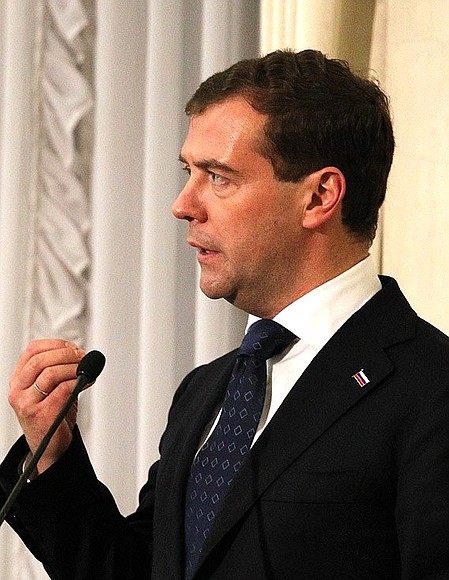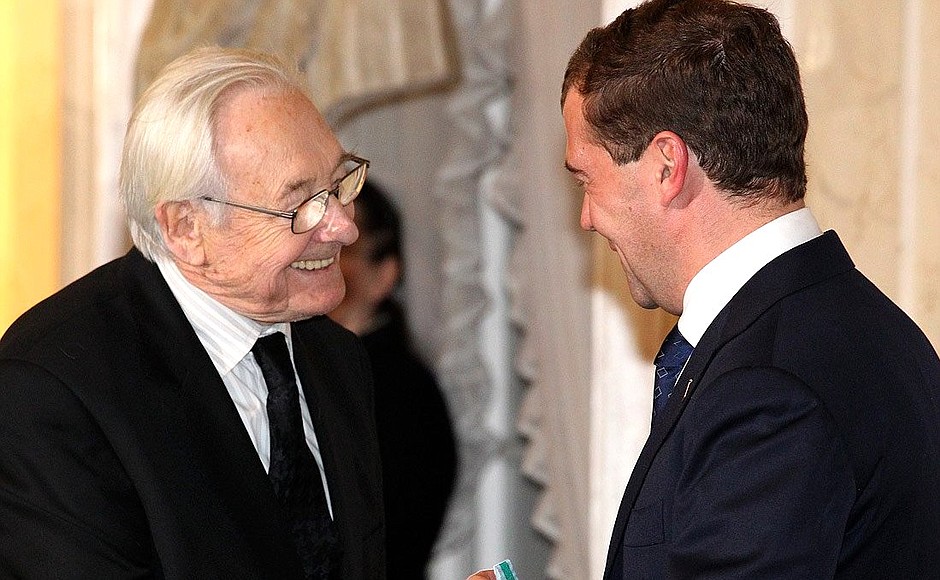In his speech, the Russian President noted that Russian-Polish relations had been weighed down by the past for a long time, but their spirit is currently undergoing a transformation. Today the most important challenge is to complete these efforts so that the two states and the two nations have no more causes for mutual distrust and doubts, Dmitry Medvedev stressed. That coincides with the Forum’s goals.
During the forum Dmitry Medvedev presented the Order of Friendship to Andrzej Wajda. The Polish filmmaker has been decorated for his outstanding contribution to the development of cultural ties between Russia and Poland. The Russian President signed the Executive Order on conferring the Order of Friendship on Andrzej Wajda on August 10, 2010.
* * *
President of Russia Dmitry Medvedev: Mr President, Mr Zanussi, Mr Drachevsky, ladies and gentlemen,
Today is a great day in our relations. Not only because the President of the Russian Federation has come to Poland on an official visit after many years, although this is important in and of itself. It is also great because the spirit of our relations, which has long been weighed down by our past, is changing.
This does not mean that the past has suddenly vanished, or that no questions remain. But I believe what’s important is that we are once again beginning to listen to one another, and to discuss the most difficult, morose, and tragic pages of our modern history. After all, often, it is not a problem of remembering the truth, but rather, of saying that truth and being ready to accept that truth.
See also
Our nations suffered a great deal in the 20th century because of the wars that rattled Europe – first and foremost, World War II – and the totalitarian regimes that destroyed many of their own citizens. It is therefore our sacred duty to finish this work, so as not to have any more causes for mutual distrust and doubt between our nations, between our states, and most importantly, between our peoples. That, in my view, is precisely the purpose of the Russian-Polish Public Forum’s work.
You know, ambitions aside, it is much easier for politicians and public officials to reach agreement when a significant part of the trail has already been blazed by civil societies. Thus, it is the civil societies, the public, that sends the signal or request for states to be friendly, for people to hear one another, for them to understand history and, at the same time, for them to look toward the future, rather than let themselves be entrapped by stereotypes. And so, we must open precisely this kind of page – or rather, chapter, as Mr President says – in our relations.
I want to emphasise again: it is not about shielding our eyes from the past or refuting it; we must talk clearly about what happened, why, and what consequences it brought. That is the only way that we can build honest relations as partners, and therefore, build relations that are mutually beneficial.
Our nations know how to trade with one another. Everything is pretty good in this regard. Despite the deterioration of political relations, things in recent years have generally been fine. We have a multi-billion dollar turnover and we have investments – they may not be enormous, but we have them. Still, things have been much more complicated in terms of political contacts.
I very much count on this visit by the Russian delegation, and the Forum opening here, to serve as very important factors in the intensification of our relations in every sense of the word.
It is true that our nations have gone through a rough patch, but at the same time, our nations are still at a relatively early phase in transforming their economies and societies. It was only a few decades ago that we began building market economies, creating the foundations for full-fledged, beneficial exchanges of goods, building our own democracies, and developing our political systems. In this regard, we still have much work to do in both the Russian Federation and in Poland. And that is precisely why the modernisation we talked about with Mr President today, as well as the agreements on modernisation that we are signing with many EU nations, including Poland, are aimed at high-quality cooperation, mutual assistance, and the creation of a high-tech, modern, free society – a society that is not weighed down by spectres of the past, but is open to trusting and friendly, close relations between people. I hope that your Forum will address this very topic today. I am certain that, given the background that Mr President and I have tried to create, the Forum may have an easier time than it would have otherwise.
I also have another very pleasant mission. I would like to carry out my duty and present a state decoration to the great film director Andrzej Wajda for his enormous contribution to the development not only of Polish, but world’s cinematography. And I think that this, too, serves as a certain symbol of our closeness and the very difficult pages in the history between Russia and Poland. I would like to say, Mr Wajda, that your work is very much appreciated and loved in our nation, and I am certain that this work, which draws heavily on the events of World War II, will continue to spur the greatest minds of our nations to strive for our countries, and therefore, our people, to be friends, to foster peace, to help us find in ourselves the strength to communicate openly and sincerely, without shielding our eyes from the difficulties of the past, but keeping them open toward the future.
I would like to wish you, Mr Wajda, good health, and I hope that everything you created in the past several decades will forever remain in the bank of world culture.
I want to once again welcome everyone gathered here and sincerely wish you great success. And let’s hear it for Mr Wajda. (Applause.)

